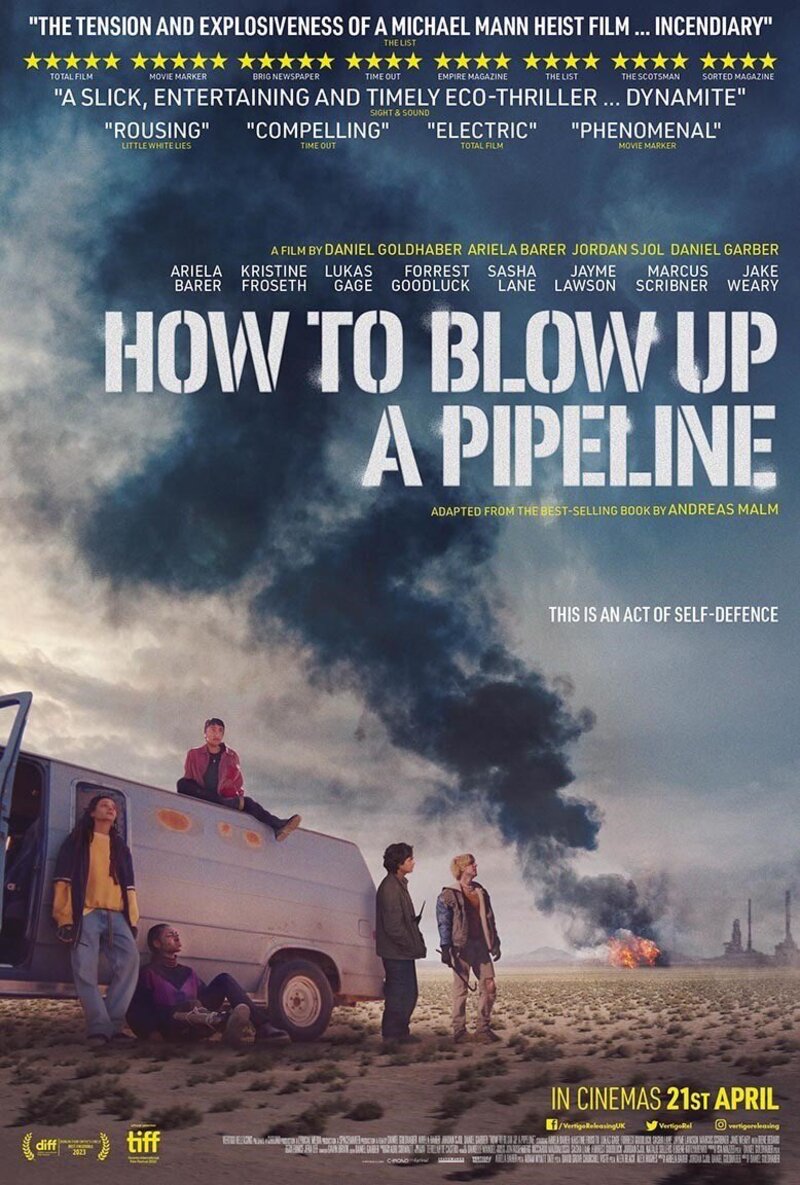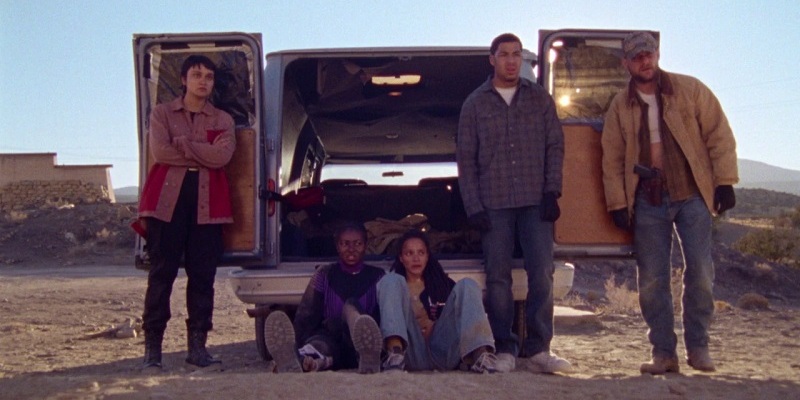
Review by
Eric Hillis
Directed by: Daniel Goldhaber
Starring: Ariela Barer, Kristine Froseth, Lukas Gage, Forrest Goodluck, Sasha Lane,
Jayme Lawson, Marcus Scribner, Jake Weary

Unlike 'The Anarchist's Cookbook', Andreas Malm's non-fiction book
'How to Blow Up a Pipeline' doesn't include any instructions on how to
actually construct bombs. Rather it's a call to arms in the fight against
climate change, arguing that pacifism is leading nowhere and that violent
action must be adopted. Inspired by Malm's book, director
Daniel Goldhaber has taken its title and constructed a heist movie in
which the target isn't a bank, casino or race track, but rather an oil
pipeline in West Texas. The movie won't teach you how to construct a bomb
either (you'll learn as much about blowing up pipelines here as you would
about assembling new life from stolen body parts by watching a Frankenstein
movie), but residents of certain countries might want to use cash to pay for
a ticket for this one, lest you end up on a government watch list.
In similar fashion to Bertrand Bonello's
Nocturama, How to Blow Up a Pipeline gives us a group of young people
who serve as either heroes or anti-heroes, terrorists or activists,
depending on your point of view. They come from both sides of the political
divide, and some don't seem to care about politics, or even the environment,
all that much.

Save for Shawn (Marcus Scribner), who grows frustrated working for a
fossil fuel divestment campaign and begins recruiting the team, all of those
involved seem motivated by personal, rather than political, reasons.
Friends Xochitl (Ariela Barer, Goldhaber's co-writer with
Jordan Sjol) and Theo (Sasha Lane) grew up in the heavily
polluted refinery town of Long Beach, California, and have both paid a
price. Xochitl's mother died during an extreme heatwave, which she blames on
global warming, while Theo has developed terminal leukemia, linked to the
refinery's emissions. Theo's girlfriend, Alisha (Jayme Lawson),
doesn't approve of Shawn's plan but goes along out of loyalty to Theo.
Native American Michael (Forrest Goodluck), who possesses the most
bomb-making knowledge of the crew, is interested solely in striking out at
the white man. Dwayne (Jake Weary) is a God-fearing all-American who
wants to take revenge on the oil company for forcing him off his family's
land. Rich kid lovers Rowan (Kristine Froseth) and Logan (Lukas Gage) seem to have adopted the cause as an act of rebellion against their
middle-class roots.
The group assembles at a shack in the Texan desert and sets about putting
their plan in place. It's clear that they don't have much in common, or
particularly like one another, as they focus on getting the job done. It's a
classic heist movie dynamic, and like many heist movies, Goldhaber employs a
flashback structure that details how each member of the crew ended up
rigging barrels filled with explosives to a pipeline in the middle of
nowhere (there's even a direct nod to Reservoir Dogs with one
character bleeding out on the back seat of a car and the potential of a mole
in the camp).

Goldhaber's previous movie,
CAM, was a thriller that functioned more effectively as a workplace drama. It
involved a cam-girl who discovered her identity is being stolen by some
malevolent force. It wasn't particularly thrilling, but it came off as a
well-researched exploration of that particular profession. The same can be
said for How to Blow Up a Pipeline. It never quite works as a thriller because it fails to generate enough
suspense from its scenario. Goldhaber struggles to nail down the specific
threats to his protagonists, and they seem in more danger of blowing
themselves up than in being caught by any authorities. There's an initially
tense sequence involving a barrel filled with explosives that we're told
will blow them all sky high if it's dropped, but it is dropped and with no
consequences. This makes a subsequent sequence that repeats the action
devoid of tension. Another sequence involving two characters being
interrupted by refinery workers is baffling in its geographical staging.
There's also the issue that the film's anti-heroes don't seem to care if
they're caught or killed, so why should we?
While thrills may be largely absent,
How to Blow Up a Pipeline proves a fascinating, methodical
look at a criminal process. In this way the crime movies it has most in
common with are of the French variety - Jules Dassin's
Rififi and Jean-Pierre Melville's
Le Cercle Rouge. Like those movies, Goldhaber's film presents us with a group of people we
may not particularly like, but whose professionalism we can't help but
admire. I don't know how accurate the portrayal of this particular form of
sabotage is, but the point is Goldhaber and his cast sell the idea that if
we don't know exactly what they're doing, they certainly do. They say there
are few things as satisfying as doing a job well, and in movies there are
few things as enthralling as watching someone do a job well.

Whether you support the actions of How to Blow Up a Pipeline's protagonists or not ultimately shouldn't cloud your enjoyment of the film.
Personally speaking I'm with Alisha in finding them a particularly naive
bunch whose actions will likely cause more harm than good, leading to a lot
of old people dying because they can't afford to heat their homes in winter
while the government bails out the oil company. But few of us condone the
armed robberies of banks, casinos and race tracks, yet we have no issues
rooting for the anti-heroes of those sort of heist movies. The young
protagonists of How to Blow Up a Pipeline may be misguided and
motivated by the wrong reasons, but it's nice to see a heist whose proposed
reward is something other than personal financial gain.


